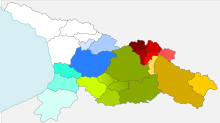
Back Adchars AN أجاريون Arabic Acarlar AZ Аджарци Bulgarian Аджараш CE Aĝaroj EO Adžaarid ET Adžarialaiset Finnish Adjars French אג'רים HE
აჭარლები, Ačarlebi | |
|---|---|
 Distribution of the Adjaran dialect | |
| Regions with significant populations | |
| Georgia (mainly Adjara), Turkey | |
| Languages | |
| Adjaran dialect of Georgian language, Turkish language (minority)[1] | |
| Religion | |
| Sunni Islam Georgian Orthodox Church[2] | |
| Related ethnic groups | |
| Gurians, Lazs, Imerkhevians and other Georgians |
| Part of a series on |
| Georgians ქართველები |
|---|
 |
| Nation |
| Georgia |
| Ancient Kartvelian people |
| Subgroups |
| Culture |
| Languages |
| Religion |
| Symbols |
| History of Georgia |
The Adjarians (Georgian: აჭარლები, romanized: ach'arlebi)[a], also known as Muslim Georgians,[b][4] are an ethnographic group of Georgians indigenous to Adjara in southwestern Georgia. Adjarian settlements are also found in the Georgian provinces of Guria, Kvemo Kartli, and Kakheti, as well as in several areas of neighbouring Turkey.
Adjarians converted to Islam during the Ottoman rule of Adjara. Under the 1921 Treaty of Kars, Adjara was granted autonomy, to protect its Muslim faith. Despite their conversion to Islam, Adjarians have kept the Georgian language (with their own dialect) and traditions.[5] Still, their self-identification is ambiguous as their Islamic background is at odds with the Orthodox faith of their Georgian peers.[4] In the 1926 census, Adjarians were categorised as a distinct ethnic group. In the 1939 census, they were included in the same category as Georgians.[6] Since Georgian independence, most Adjarians consider themselves Georgians,[7][2] but some Georgians have seen Muslim Adjarians as second-class "Turkicized" Georgians.[8][9][6][10][11]
- ^ Balci, Bayram; Motika, Raoul (2007). "Islam in post-Soviet Georgia1". Central Asian Survey. 26 (3): 335–353. doi:10.1080/02634930701702399. ISSN 0263-4937.
Indeed, the Turkish language has not disappeared from remote rural or mountainous areas of Adjaria, where the elders still speak it fluently.
- ^ a b Cite error: The named reference
Nodia2006was invoked but never defined (see the help page). - ^ George 2009, p. 121.
- ^ a b George 2009, p. 23.
- ^ Khazanov, Anatoly Michailovich (1995). "People with Nowhere To Go: The Plight of the Meskhetian Turks". After the USSR: Ethnicity, Nationalism and Politics in the Commonwealth of Independent States. University of Wisconsin Press. p. 195. ISBN 978-0-299-14894-2.
- ^ a b Toft, Monica Duffy (2003). The Geography of Ethnic Violence: Identity, Interests, and the Indivisibility of Territory (PDF). Princeton University Press. p. 108. ISBN 978-0-691-12383-7.
- ^ George 2009, p. 183.
- ^ "Ajarians | Encyclopedia.com". www.encyclopedia.com. Retrieved 25 October 2023.
- ^ de Waal, Thomas (2019). The Caucasus: An Introduction (2 ed.). Oxford University Press. p. 149. ISBN 978-0-19-068311-5.
- ^ "Toward Inclusion: Understanding the Path to Unity in Georgia". Civil Georgia. 11 October 2023. Retrieved 26 January 2024.
Among ethnic Georgians, nationalist narratives dating back to the Soviet period highlight fears that minority groups could lay claims over Georgian territory. These fears were substantiated and entrenched by the traumatic experiences of the 1990s. A more fundamentalist narrative portrays minorities as guests or second-class citizens on Georgian territory, which should be subordinated to "true" Georgian national identity (Kartveloba). Against this backdrop, some minorities have perceived integration efforts as assimilation threats to their legitimate ethnic identities.
- ^ Zviadadze, Sophie (January 2018). "The Unbearable Lightness of Being Muslim and Georgian: Religious Transformation and Questions of Identity among Adjara's Muslim Georgians". Region: Regional Studies of Russia, Eastern Europe, and Central Asia. 7 (1): 36.
Cite error: There are <ref group=lower-alpha> tags or {{efn}} templates on this page, but the references will not show without a {{reflist|group=lower-alpha}} template or {{notelist}} template (see the help page).